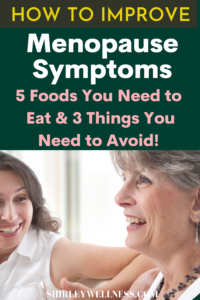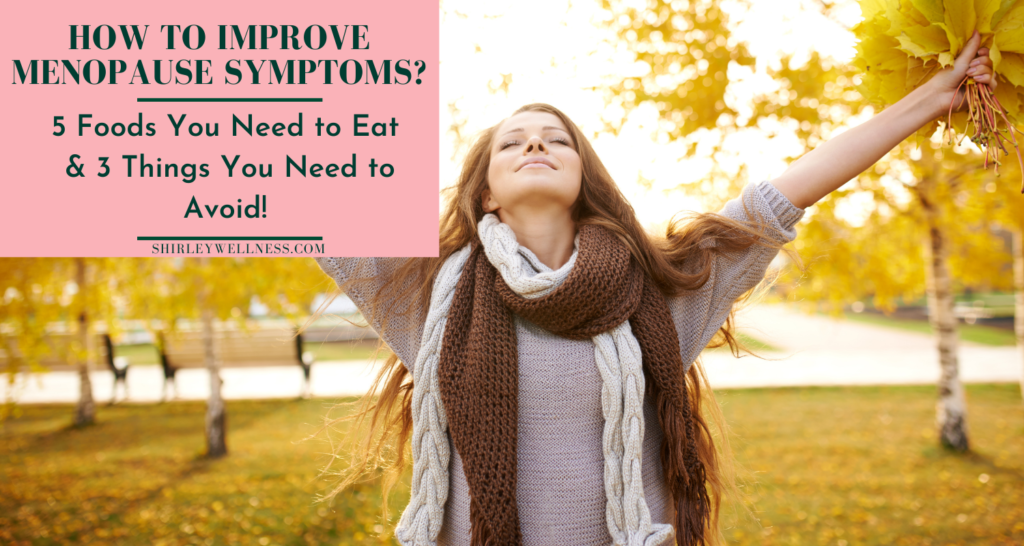5 Foods You Need to Eat & 3 Things You Need To Avoid!
What you eat during Peri-menopause or Menopause can be super important if you want to Improve Menopause symptoms. According to studies, some Menopause symptoms can potentially be reduced by eating certain foods and could be made worse by not having certain foods in your diet.
What is Menopause?
So Menopause is when you haven’t had a period consecutively for at least a year but in the years leading up to this, there are a ton of changes happening in your body. These are triggered by hormonal changes but there’s a lot you can do to try to negate the effects.
Let’s talk about the links between Peri-menopause, Menopausal symptoms and Diet:
Non-Dairy Products and Menopause
According to studies, it is suggested that Menopause is easier for women in certain Asian countries than for Western women. Women in Asia are more likely to follow a more traditional plant based diet.
Where we in the Western world consume a lot more meat, about four times as much fat and a diet low in fiber than women on traditional Asian rice-based diets.
A diet high in fat and low in fiber causes estrogen levels to rise. Women on higher-fat diets have more estrogen activity than those on low-fat diets.
In menopause, the ovaries’ production of estrogen stops. Those women who have been on high-fat diets have a dramatic drop in estrogen levels.
The drop seems to be far less for Asian women who have lower levels of estrogen before and after menopause. So symptoms are much milder or even nonexistent.
Research suggests that animal-based meals affect hormone levels quickly and strongly and undoubtedly contribute to the menopausal problems that are common in Western countries.
With this in mind it is very possible to obtain all our nutrients and vitamins from non- dairy sources and this can help protect against the increased risk of bone fractures that can occur after menopause.
Vitamin D and Vitamin K are super important for bone health, and they’re readily available in non-dairy foods.
According to one study, consuming higher levels of calcium and vitamin D reduced the risk of early menopause by 17%.
1st Takeaway:
If you want to improve menopause symptoms making sure your diet contains plenty of the following would be a great start:

Calcium: (found in)
- Broccoli
-
Almonds
-
Figs
-
Dark leafy greens
-
Fortified foods such as cereals, orange juice and plant based milks
Phosphorus: (found in)
-
Beans
-
Legumes (e.g. alfalfa, beans, peas, chickpeas, lentils, carob, soybeans, peanuts)
-
Nuts
-
Whole Grains
-
Vegetables and Fruit
Potassium rich foods: (found in)
-
Bananas, oranges, cantaloupe, honeydew, apricots, grapefruit (some dried fruits, such as prunes, raisins, and dates, are also high in potassium)
-
Cooked spinach
-
Cooked broccoli
-
Potatoes
-
Sweet potatoes
-
Mushrooms
-
Peas
-
Cucumbers
Also Protein, Zinc, Magnesium and Selenium, Vitamins A, D & B12 can help protect against the health effects associated with menopause and may even delay its onset.
Protein and Menopause
Eating plenty of protein can help counteract loss of bone strength and muscle mass — both of which can be more likely after menopause.
According to the National Library of Medicine, in one study a higher protein intake reduced the risk of hip fractures.
Protein sources:
(Seitan- a popular protein source for many vegetarians and vegans)
-
Tofu, Tempeh and Edamame. Tofu, tempeh and edamame all originate from soybeans
-
Lentils
-
Chickpeas and Most Varieties of Beans
-
Nutritional Yeast
-
Spelt and Teff
-
Hemp seed
-
Green Peas

2nd Takeaway:
You can be more likely to experience fractures and broken bones after menopause, mostly as a result of lower bone density.
Making sure protein is a key part of your diet during peri-menopause can reduce this risk and help improve bone health.
Omega-3 Fatty Acids and Menopause
Healthy fats can help improve menopause symptoms — especially omega-3 fatty acids.
Omega-3 supplements can potentially help hot flashes and night sweats, according to a Randomized Controlled Trial in Native American Post-Menopausal Women.
The results of the study indicate that Native American post menopausal women benefit from regular consumption of flaxseed (Omega-3). By reducing their risk of cardiovascular disease, as seen from lowered total cholesterol levels.
3rd Takeaway:
Ensure your diet has sufficient Omega-3 if not consider supplements
Whole Grains and Menopause
Whole grains can reduce your risk factor for heart disease, which is slightly higher after menopause.
Eating at least 2 servings of whole grains reduced the risk of heart disease by up to 30% compared to eating a diet that’s super high in refined carbs.
In a study of over 11,000 post menopausal women, eating 4.7g of whole-grain fiber per 2000 calories consumed reduced the risk of early death by 17% compared to only eating 1.3g per 2000 calories consumed.
4th Takeaway:
Eating a good amount of whole grains can help keep your heart healthy as you move through menopause — and beyond it.
This is super important given that heart disease can be a bigger problem post-menopause. Brown rice, quinoa, and whole wheat bread are perfect choices for this.
Fruits and Vegetables and Menopause
Eating plenty of fruits and veggies is super crucial at any stage of life but even more so as you approach menopause.
If you are serious about how to improve menopause symptoms this point is paramount to changing your habits. In a Trial of more than 17,000 postmenopausal women, eating fruits, veggies, and soy led to a 19% decrease in hot flashes compared to the control group.
Broccoli is one veggie you’ll definitely want to eat plenty of. It can reduce levels of a type of estrogen that may be a factor in breast cancer, while also increasing levels of a type of estrogen that could protect against breast cancer.
The end result? You could be a whole heap more likely to negate the higher risk of breast cancer that can occur after menopause.
5th Takeaway:
Eat more Fruits, Vegetables and Soy.
3 Things to Avoid for Menopausal Symptoms
So now you know which foods can potentially be super effective at improving menopause symptoms during menopause, let’s talk briefly about the ones that are best avoided.
-
Avoiding added sugars and processed foods can keep blood sugar levels in check. Along with insulin resistance and metabolic syndrome, high blood sugar can be a culprit for hot flashes.
-
Alcohol and caffeine can be super common triggers for hot flashes and can make them more severe.
-
Spicy foods can also worsen hot flashes. A ton of women find that hot flashes are more intense and frequent after eating something spicy.
What To Do Next?
FOR MORE TIPS & ADVICE PLUS SUPPORT JOIN MY FACEBOOK GROUP

